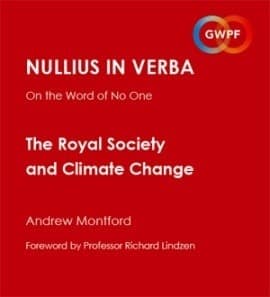In recent years the world’s oldest science academy has been taken for a joyride. Three centuries of neutrality have been impulsively abandoned.
To be a climate skeptic is to find oneself in an awkward spot. Eminent science organizations have publicly declared that human beings are causing dangerous climate change. Among these are the US National Academy of Sciences, the Science Council of Japan, the Académie des Sciences in France, and the Russian Academy of Sciences.
How can rational, intelligent people not take their word for it? How can someone such as myself – who lacks any scientific training whatsoever – imagine that my own misgivings deserve to be taken seriously when such esteemed bodies have spoken?
Yesterday a new report was released that goes a long way toward answering those questions. Written by Andrew Montford, the author of The Hockey Stick Illusion and the Bishop Hill blog, it takes a close look at the misbehaviour of the world’s oldest science academy.
The UK’s Royal Society was founded in 1660. For more than 300 years, Montford writes, it “adopted a position of aloofness from political debates, refusing to become embroiled in the controversies of the day.” Throughout the 18th and 19th centuries, the society’s journal explicitly declared that it was not the job of that organization:
to give an official ruling on scientific issues, for these are settled far more conclusively in the laboratory than in the committee room.
This circumspect approach was reinforced by the Royal Society’s longstanding motto: Nullius in verba – a Latin phrase which means on the word of no one or nobody’s word is final.
But in recent years, while few of us were paying attention, the Royal Society was taken for a joyride. Three centuries of tradition were impulsively abandoned.
Pronouncements are now issued from the mountaintop about who is right and who is wrong regarding scientific questions. Moreover, the Society has become a hive of political activity – releasing press statements, making demands on politicians, criticizing democratically elected presidents in foreign countries, and harassing corporations.
It is important to understand that the membership of the Royal Society, the “1,500 Fellows and Foreign Members, including more than 80 Nobel Laureates” for whom the Society claims to speak, were never consulted about this monumental change of direction. Nor were the views of the broader membership taken into account before the Society began making climate change rulings in their name.
The Royal Society’s first global warming statement appeared in 1989. Montford reports that it was measured in its language and upfront about the fact that many aspects of our climate are poorly understood. A mere ten years later, however, the Society released a new report which declared:
The CO2 issue is real and increasingly urgent.
If you’re thinking that this was an awfully long way for science to travel in such a short time span, it may be worth noting that the Kyoto Protocol was adopted in December 1997 and that, in the years that followed, a great many people went to a great deal of trouble to persuade additional countries to ratify it.
Fully half of Montford’s 40-page report is devoted to describing, in disheartening detail, the myriad climate faux pas of the Royal Society since the year 2000. This body now appears to be just another arm of government (its main source of funding) promoting the global warming party line.
For example, the Society has made numerous statements about climate change that are scientifically dubious. One example is a BBC television show narrated by its current President, Sir Paul Nurse. Montford writes:
A large section of the programmed was given over to a defence of the global warming hypothesis, with evidence for the ‘consensus’ position presented by a NASA scientist named Bob Bindschadler.Bindschadler embarrassingly claimed that manmade emissions of carbon dioxide dwarfed natural ones, when even the [Intergovernmental Panel on Climate Change’s] own figures show that the opposite is true.
The error was later acknowledged by Bindschadler. But that doesn’t change the fact that the president of the Royal Society knows so little about the subject matter on which he was lecturing the rest of us that he failed to notice this howler.
The Society also now meddles in realms in which it can claim no expertise at all – for example, economics. When the controversial Stern Review – a report written by UK government economists – was released in October 2006, the official launch was held not at a government facility but at the Royal Society headquarters.
In other words, the Society’s then president, Sir Martin Rees, chose to associate the good name of his eminent, centuries-old scientific organization with an economics report that would later be called “deeply flawed” and “well outside the mainstream of published economic writings” with respect to certain key calculations (see pp. 36, 46, 59 and 60; backup link here).
By late 2009, some of the Fellows of the Royal Society had began to push back. As a result of their efforts, in late 2010 a new statement on climate change was issued that is more neutral. Montford observes:
the Society chose to present its new paper as a development of their previous papers rather than what it actually was – a radical change.
The fact that a contingent within the Society is now attempting to set things right is encouraging. But that does not erase the harm that has been done. In Montford’s view, the Society’s tarnished reputation will not be restored – nor trust rebuilt – until this organization openly acknowledges what has transpired.
For the past 13 years those in charge of this venerated institution have taken it on a reckless and costly detour.
The report was funded and published by the Global Warming Policy Foundation. Read the entire thing here. It’s a stunner.






